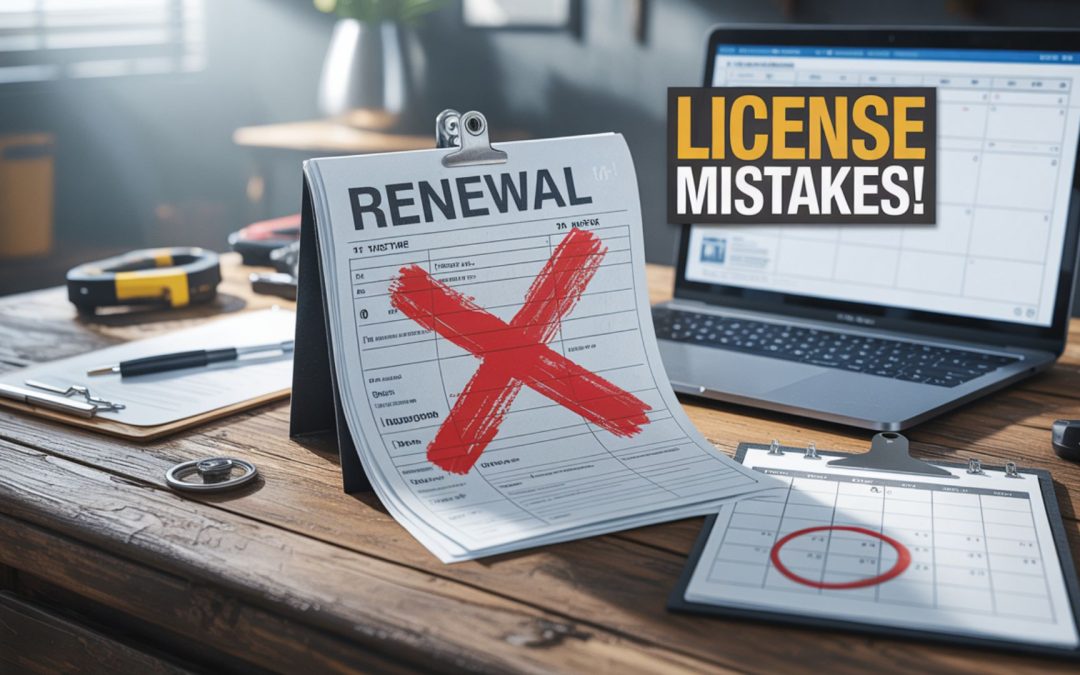Avoiding common mistakes to avoid during HVAC license renewal is essential for a smooth process. This blog covers the most frequent errors contractors make and offers tips to help you renew your license efficiently.
Key Takeaways
- Always set reminders for renewal deadlines to avoid penalties and maintain your professional credibility.
- Ensure all documentation is complete and accurate to prevent delays and preserve your license status.
- Stay updated on licensing requirements, including education and safety standards, to enhance your skills and keep your business compliant.
Missing Renewal Deadlines
One of the most common mistakes HVAC contractors make is missing renewal deadlines. In Tennessee, for instance:
- A contractor’s license must be renewed every two years.
- The renewal application is due 30 days before expiration.
- Failing to renew on time can result in penalties, additional fees, and even the inability to legally operate.
- If you miss the deadline by more than a year, your license is considered void, and you’ll have to start the application process from scratch.
Set reminders well ahead of your renewal date using digital calendars or scheduling apps. This proactive approach prevents the 10% per month penalty fee for late renewals, keeping you compliant and stress-free. If you pay attention to these reminders, you can avoid any issues.
Remember, timely renewal not only keeps your business running smoothly but also upholds your professional credibility. Clients and employers expect you to stay licensed and ready to work. Proactively managing renewals demonstrates reliability and commitment, setting you apart in the competitive HVAC industry. Navigating HVAC license renewal in Texas can feel overwhelming, but with the right guidance, it’s both simple and efficient. From annual renewal fees to completing eight hours of TDLR‑approved continuing education, our guide clarifies the steps to keep your credentials up to date.
Incomplete Documentation
Another major hurdle in the HVAC license renewal process is incomplete documentation. Imagine gathering all your paperwork only to find out a critical document is missing at the last minute. This scenario is all too common and can lead to significant delays. Necessary documentation for HVAC licensing includes:
- Proof of education
- Work experience records
- Identification papers
- Proof of liability insurance
- Previous licenses.
Common errors, such as incomplete records and missing employer verification, can derail your renewal process. Ensure all information in your application is precise and up-to-date to prevent delays. Incomplete documentation can result in steep fines or permanent license revocation, leading to the completion of your application being jeopardized.
Avoid these pitfalls by creating a checklist of required documents well in advance to avoid delays. Verify each document’s accuracy and ensure you have all necessary verifications to obtain it. This thorough approach not only speeds up the process but also establishes a solid foundation for your professional credibility. Remember, attention to detail in your paperwork reflects the quality of your materials, services, and projects and can provide proof of your diligence.
Ignoring Continuing Education Requirements
Continuing education is a cornerstone of staying compliant with HVAC licensing requirements. In Tennessee:
- HVAC contractors must complete 8 hours of continuing education every two years for license renewal.
- This requirement applies to contractors who obtained their licenses on or after June 1, 2009.
- Submitting proof of completed continuing education is a mandatory part of the renewal process.
Continuing education ensures that HVAC professionals stay updated on the latest codes, safety standards, and green technologies, including heating technologies. Many courses are available online, offering the flexibility to complete them at your convenience. Prioritizing ongoing education keeps you compliant while enhancing your skills, making you more valuable to clients and employers.
Regularly check your state’s licensing board website for specific requirements and course options. Investing time in these courses demonstrates your commitment to excellence and positions you as a leader in the HVAC industry.
Not Using a Licensed CPA for Financial Statements
Engaging a licensed CPA is critical for the HVAC license renewal process. The Tennessee Board of Contractors requires:
- Financial statements prepared by a CPA for acceptance in licensing processes.
- Only audited or reviewed financial statements are acceptable.
- Compiled financial statements will not be accepted.
Utilizing a Certified Public Accountant helps ensure the reliability and accuracy of your financial statements, reducing the risk of rejection. Employing a CPA safeguards the smooth renewal of your HVAC license and avoids delays or denials.
This professional oversight not only ensure compliance but additionally also reinforces the financial health and success of your money budget rules companies business.
Overlooking License Classification Changes
Staying informed about changes in license classifications is crucial for HVAC contractors. New HVAC regulations in 2023, for instance, require increased energy efficiency standards and the use of refrigerants with lower global warming potential. Efficiency metrics for HVAC systems have also changed, affecting how efficiency ratings are calculated.
To remain compliant, contractors should regularly check their state’s air conditioning licensing board website. Ignoring these changes can lead to non-compliance, which can have serious repercussions for your business. Staying updated ensures that you can adapt to new standards and continue providing high-quality services to your clients.
Misclassifying Workers
Misclassifying workers is a costly mistakes that can severely impact your labor job business. Misclassification can result in hefty penalties and legal troubles. To avoid these issues, it’s advisable to consult legal professionals who can guide you on proper worker classification.
Mandatory workers’ compensation insurance for all contractors will be implemented starting on January 1, 2028. This is a new requirement that will take effect at the beginning of that year. This change underscores the importance of correctly classifying your employees and ensuring they have the necessary coverage. Proper classification not only protects your business from legal repercussions but also upholds your professional credibility.
Failing to Maintain Detailed Records
Maintaining detailed records is essential for defending against disputes or audits. A thorough record of contracts and changes can protect you in legal disputes and audits. Detailed records of contractual activities serve as crucial evidence in legal situations and help maintain accountability and compliance.
Accurate audit trails provide a transparent history of contract interactions, facilitating smoother internal and external audits. Effective record-keeping also streamlines the management of contract versions and changes. Regularly checking and updating your records ensures that your business operations remain transparent and accountable.
Submitting Inadequate Contracts
Submitting inadequate contracts is a common pitfall that can lead to legal challenges. Contracts should include:
- Detailed disclosures and payment schedules
- Specifics regarding the scope to prevent misunderstandings
- Clear definitions to prevent disputes regarding each party’s responsibilities.
It is essential to submit accurate information to avoid complications. To minimize risks, contracts should outline payment terms, project timelines, and detailed descriptions of work, including costs. Regularly updating contracts to reflect changes in the scope of work can prevent future disagreements. Including conditions for changes or amendments in contracts ensures that all parties are aware of the terms.
Detailed timelines and milestones in contracts aid in tracking project progress. Robust contracts protect your business and enhance your professional reputation, providing practical insights.
Bidding Without Proper Licensing
Bidding without proper licensing is a risky move that can lead to severe consequences. Key points to consider include:
- Discussing a bid or negotiating a price without an active contractor’s license is prohibited.
- Contractors must include their license details on bids.
- Bids without license details can be rejected.
Key points regarding project classification and licensing requirements:
- Having a classification that covers at least 60% of the project is essential for bidding.
- For portions exceeding $25,000, subcontracting is required if the classification doesn’t cover it.
- Proof of licensing is crucial for HVAC contractors as clients and contractors require it before awarding jobs.
Having the proper licensing process before bidding demonstrates professionalism and adherence to regulations, protecting your business from penalties and building trust with potential clients. To ensure compliance, it is essential to register for certification.
Ignoring New Safety Standards
Ignoring new safety standards can have dire consequences for your business. Learning about new safety protocols significantly reduces the risk of lawsuits and injuries associated with HVAC work. Adhering to the latest safety standards reduces liability and contributes to a safer work environment.
Following updated safety protocols not only protects your business from legal actions but also ensures the safety of all involved. Staying compliant with industry standards demonstrates your commitment to maintaining safe practices and a professional work environment.
Neglecting to Vet Subcontractors
Neglecting to vet subcontractors can lead to significant legal and financial repercussions. Prime contractors must ensure that subcontractors they hire possess the appropriate licenses and bonds as mandated by state regulations. Engaging unlicensed subcontractors can expose you to liability for accidents or poor workmanship.
Subcontractors are often hired for specific tasks, and verifying their qualifications is vital for project compliance and safety. By thoroughly vetting subcontractors and ensuring they have the right equipment, you protect your HVAC business and ensure the highest standards of work are maintained.
Final Thoughts
Successfully renewing your HVAC license requires careful planning, attention to deadlines, and compliance with state regulations. Avoiding mistakes like missing renewal dates, submitting incomplete documentation, and neglecting continuing education ensures a smooth and stress-free process. Staying updated on licensing changes, using a licensed CPA, and keeping accurate records further strengthen your compliance and professional credibility.
For all your continuing education needs during TDLR HVAC license renewal, trust State Approved Continuing Education. Our continuing education courses in Texas are designed to be flexible, affordable, and hassle-free, helping you stay compliant while saving time and money.
We also offer a wide range of courses for other professions, including cosmetology courses, electrician courses, seller training, and auctioneer license renewal courses. Whether you are renewing your license or expanding your skills, our expert team is here to help. Contact us today to learn more about our comprehensive continuing education options.
Frequently Asked Questions
What are the consequences of missing the HVAC license renewal deadline?
Missing your HVAC license renewal deadline can lead to penalties, extra fees, and the inability to operate legally, so knowing what to do if you miss your HVAC license renewal deadline is essential to keep your business running smoothly.
What documentation is necessary for HVAC license renewal?
To renew your HVAC license, you need proof of education, work experience records, identification, liability insurance, and your previous licenses. Make sure to gather these documents to streamline your renewal process and keep your career moving forward!
How many hours of continuing education are required for HVAC license renewal in Tennessee?
To renew your HVAC license in Tennessee, you need to complete 8 hours of continuing education every two years. Stay proactive and keep your skills sharp!
Why is it important to use a licensed CPA for financial statements?
Using a licensed CPA guarantees the reliability and accuracy of your financial statements, which is essential for meeting legal and regulatory requirements. Trusting a professional ensures your financial health is in capable hands!
What are the risks of not vetting subcontractors?
Not vetting subcontractors exposes you to potential legal and financial risks, including liability for accidents and subpar work. Make sure to verify their licenses and bonds to protect your interests!



